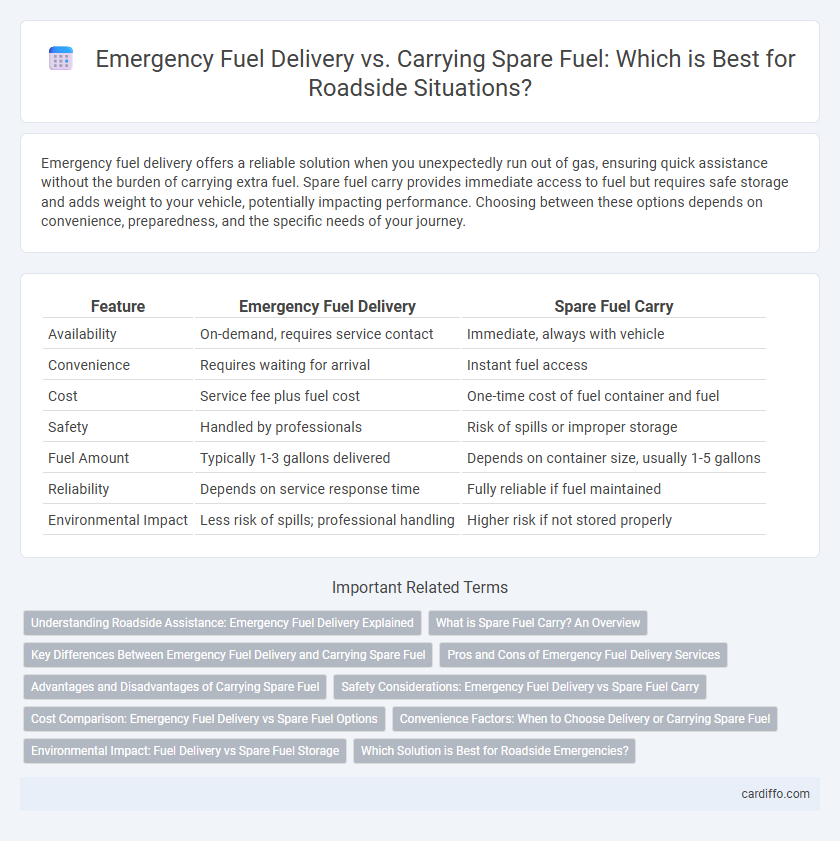Emergency fuel delivery offers a reliable solution when you unexpectedly run out of gas, ensuring quick assistance without the burden of carrying extra fuel. Spare fuel carry provides immediate access to fuel but requires safe storage and adds weight to your vehicle, potentially impacting performance. Choosing between these options depends on convenience, preparedness, and the specific needs of your journey.
Table of Comparison
| Feature | Emergency Fuel Delivery | Spare Fuel Carry |
|---|---|---|
| Availability | On-demand, requires service contact | Immediate, always with vehicle |
| Convenience | Requires waiting for arrival | Instant fuel access |
| Cost | Service fee plus fuel cost | One-time cost of fuel container and fuel |
| Safety | Handled by professionals | Risk of spills or improper storage |
| Fuel Amount | Typically 1-3 gallons delivered | Depends on container size, usually 1-5 gallons |
| Reliability | Depends on service response time | Fully reliable if fuel maintained |
| Environmental Impact | Less risk of spills; professional handling | Higher risk if not stored properly |
Understanding Roadside Assistance: Emergency Fuel Delivery Explained
Emergency fuel delivery offers immediate roadside assistance by delivering the exact amount of fuel needed to get a vehicle running again, reducing wait times and stress compared to carrying spare fuel. Unlike spare fuel carry, which requires planning and storage, emergency fuel delivery services are accessible anytime and eliminate safety risks associated with handling fuel. This service is crucial for drivers who want professional assistance and peace of mind during unexpected fuel shortages on the road.
What is Spare Fuel Carry? An Overview
Spare fuel carry involves transporting an extra container of fuel for a vehicle, ensuring availability during unexpected shortages or long trips without nearby refueling stations. This practice requires safe, approved fuel containers and adherence to local regulations to prevent hazards. Unlike emergency fuel delivery services, spare fuel carry provides immediate access to fuel but depends on prior preparation and vehicle storage capacity.
Key Differences Between Emergency Fuel Delivery and Carrying Spare Fuel
Emergency fuel delivery provides on-demand fuel replenishment through professional services, ensuring convenience and minimizing vehicle downtime during unexpected fuel shortages. Carrying spare fuel involves physically storing extra fuel in containers, offering immediate access but posing safety risks and added weight concerns. The key differences lie in safety, response time, and logistical convenience, with emergency fuel delivery emphasizing professional handling and spare fuel focusing on self-sufficiency.
Pros and Cons of Emergency Fuel Delivery Services
Emergency fuel delivery services provide fast, reliable assistance when drivers run out of fuel unexpectedly, avoiding the hassle of carrying extra fuel containers. These services eliminate the risk of spills and safety hazards associated with spare fuel storage, ensuring compliance with transportation regulations. However, reliance on emergency delivery can incur higher costs and potential wait times compared to having spare fuel on hand.
Advantages and Disadvantages of Carrying Spare Fuel
Carrying spare fuel provides immediate access during unexpected fuel shortages, reducing wait times for emergency fuel delivery, which can be unavailable in remote areas. However, spare fuel storage poses safety risks such as fire hazards and potential fuel contamination, alongside added vehicle weight that impacts fuel efficiency and handling. Emergency fuel delivery eliminates storage risks but may result in longer delays and higher costs, especially in less accessible locations.
Safety Considerations: Emergency Fuel Delivery vs Spare Fuel Carry
Emergency fuel delivery eliminates the risk of carrying flammable liquids in a vehicle, reducing fire hazards and ensuring compliance with safety regulations. Spare fuel carry increases the chance of fuel spillage or leaks, potentially causing environmental damage and posing health risks during accidents. Prioritizing emergency fuel delivery services enhances driver safety through professional handling and proper fuel storage protocols.
Cost Comparison: Emergency Fuel Delivery vs Spare Fuel Options
Emergency fuel delivery services typically incur higher costs due to on-demand service fees, call-out charges, and fuel markup, averaging $50 to $150 per delivery depending on location and urgency. Carrying spare fuel in a container involves a one-time investment in fuel canisters, generally under $50, plus fuel cost, offering a more cost-effective, proactive solution for preventing fuel-related stranding. Comparing expenses, spare fuel carry is economically advantageous for frequent drivers or remote area travelers, while emergency delivery serves better for infrequent or unexpected fuel emergencies.
Convenience Factors: When to Choose Delivery or Carrying Spare Fuel
Emergency fuel delivery offers convenience by eliminating the need to carry extra fuel, ideal for drivers who prioritize reduced weight and space in their vehicles. Carrying spare fuel provides immediate access during remote trips or in areas with unreliable service, ensuring self-sufficiency without waiting for assistance. Choosing between these options depends on factors like travel distance, availability of delivery services, and the urgency of potential refueling needs.
Environmental Impact: Fuel Delivery vs Spare Fuel Storage
Emergency fuel delivery reduces the environmental risks associated with storing excess fuel, such as leaks and spills that contaminate soil and groundwater. Carrying spare fuel involves transporting additional fuel containers, increasing the likelihood of accidental spills and emissions during handling and storage. Utilizing emergency fuel delivery services minimizes the ecological footprint by supplying only the needed amount of fuel when required, thereby lowering environmental hazards linked to overstocking.
Which Solution is Best for Roadside Emergencies?
Emergency fuel delivery offers rapid assistance by delivering fuel directly to stranded vehicles, minimizing wait times and ensuring faster resumption of travel. Carrying spare fuel provides immediate self-reliance but poses risks such as fuel spillage and added vehicle weight, which can affect safety. For roadside emergencies, professional emergency fuel delivery is generally the best solution due to its convenience, safety, and reliability.
Emergency Fuel Delivery vs Spare Fuel Carry Infographic

 cardiffo.com
cardiffo.com